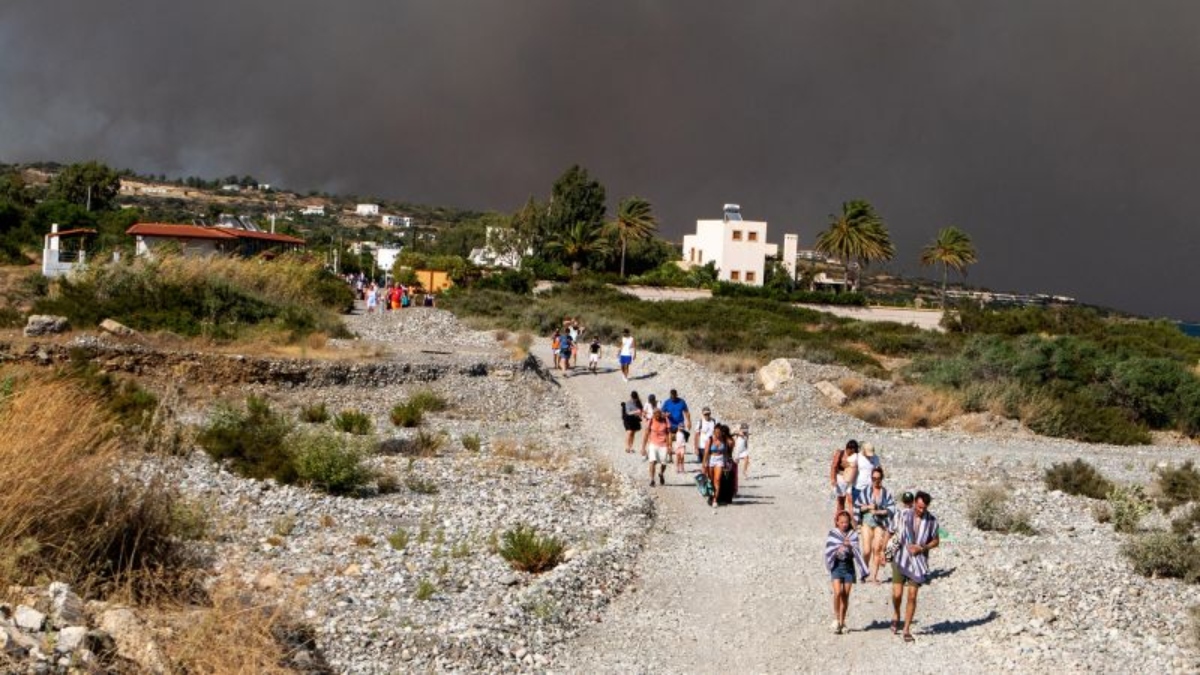(CNN) – A massive forest fire ravaging the Greek island of Rhodes has forced thousands of tourists to flee their hotels in what Greek authorities described as the largest evacuation in the country’s history.
Those affected by the fire described chaotic and terrifying scenes, some of whom had to leave on foot or search for their own means of transportation after they were ordered to leave the place.
The central and southern part of Rhodes, an island very popular with tourists, has been burning since Tuesday. They are the biggest fires in Greece, which have been put out by a heat wave that experts say could become the longest ever recorded in the country.
Amy Leiden, a British tourist in Rhodes, said she was told to leave the hotel immediately or “she and her family wouldn’t be able” to.
“It was terrifying,” he told Sky News. “We had our 11-year-old daughter with us and we were walking down the road at 2am and we were getting caught in the fire.”
Cedric Jesse, a Belgian tourist, ran away on Saturday with nowhere to go. “We informed the hotel about the messages we received on our phones to evacuate the area, but they didn’t notice,” he told public broadcaster RTBF.
“In fact, we only took our identification documents, water and something to cover our faces and heads.”
The Greek government reported that nearly 19,000 people had been evacuated on Rhodes since Saturday.
The government called the operation “the largest effort of its kind ever in Greece,” saying 16,000 people, including tourists and residents, had been transported by land and 3,000 by sea.
According to the local fire service, there are currently three active fronts that firefighters are focusing on in the central and southern part of the island.
The fire was burning near the districts of Kiotari and Lardos, near the archaeological site of Lindos. To date, the site has not been threatened.
Hotels, schools, sports centers and conference centers have been activated in safe areas of the island to house the evacuees.
The Greek Ministry of Foreign Affairs will set up an assistance service to help tourists return to their countries, according to the Greek government. In addition, tour operators ordered charter flights to land in Rhodes without passengers “to pick up passengers who wish to leave the island.”
Firefighters took eight people to hospital with breathing problems.
British airline Jet2 on Sunday canceled all its flights and holiday packages to Rhodes. Tour group TUI has also canceled all holiday packages to the Greek island through Tuesday, due to the ongoing wildfires, the two companies said in two statements.
A record heat wave is expected
According to the Greek Ministry of Civil Protection, 13 districts, including the Attica region, where the capital Athens is located, were on red alert on Sunday to face forest fires, the highest alert due to the high risk of fires.
In Athens, the hours for visiting the Acropolis and other archaeological sites have been modified due to the high temperatures. Workers at some sites are on strike to protest working conditions.
“It is likely that we will see a heat wave of 15-16 days, something that has never happened in our country,” Kostas Lagovardos, director of research at the National Observatory of Athens, told CNN.
The line may cross those days, Lagovardos told CNN, but right now it’s “hard to speculate.”
Lagovardos said that the longest continuous heatwave that Greece had faced was 12 days in July 1987.
Lagovardos said temperatures in Athens this summer could shatter the city’s all-time record, which was set in June 2007, when Athens recorded 44.8 degrees Celsius (112.64 degrees Fahrenheit).
A tourist is cooled with ice cubes at the entrance to the Acropolis in central Athens. (Photo: Socrates Baltagiannis / picture alliance / Getty Images)
Large parts of the northern hemisphere experienced extreme temperatures, as Europe shifted from one form of extreme weather to another.
A hail of tennis-sized ball fell in the northern Italian region of Veneto on Wednesday night, injuring at least 110 people. Emergency services have responded to more than 500 emergency calls for material and personal damage, the Veneto Regional Civil Protection reports.
And in the capital, Rome, a new maximum temperature of 41 degrees Celsius was reached on Tuesday. At the beginning of the year, the country suffered devastating floods.
CNN affiliate N1 reported Thursday that strong thunderstorms in the Balkans claimed several lives on Wednesday.
Scientists warn that extreme weather may be just a preview of what will happen as the planet warms.
“Extreme weather events will continue to become more intense and our weather patterns may change in ways we can’t yet predict,” Peter Stott, a climate attribution research scientist at the UK’s Met Office, told CNN.
CNN’s Susanna Cullinan contributed to this report

“Music buff. Social media lover. Web specialist. Analyst. Organizer. Travel trailblazer.”

:quality(85)/cloudfront-us-east-1.images.arcpublishing.com/infobae/TEQF6EONZRFGLLLDIDD4L2O4EE.jpg)

:quality(75)/cloudfront-us-east-1.images.arcpublishing.com/elcomercio/XU32LRAEZFDDPNVHLFU3CKVBYY.jpg)



More Stories
Sheinbaum, Galvez, Mainz campaign wrap-up, news and more
Sheinbaum and Mainz’s CDMX campaign wraps up: Road Alternatives and Street Closures
Ortega attacks Humberto Ortega and declares him a “traitor to the country”